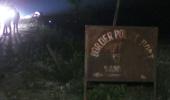The report of the National Bomb Data Centre has said the July 18 blast at an eatery in Shimla's Mall Road in which two people died and over 10 were injured was caused due to a high explosive and not a gas leak.

The report of the National Bomb Data Centre, under the National Security Guard, differs from that of the State Forensic Science Laboratory, Junga, and the police investigation according to which a gas leak had caused the blast.
The blast occurred at the Himachali Rasoi restaurant in Middle Bazaar adjacent to the fire brigade office in the heart of the city.
An NBDC team visited the blast site on July 23 for investigation.
"The two (preliminary and confirmatory) reports of the NBDC pointed out that it was a high explosive and not a gas leak that led to the blast," Himachal Pradesh director general of police Sanjay Kundu told PTI on Thursday.
Investigation in the case has been handed over to the CID, which has been instructed to take help of central agencies to unravel the truth, he added.
The place where the blast occurred is sensitive, being located near the police reporting room. A large number of tourists also visit the area, Kundu said.
Keeping in view the sensitivity of the case and to ensure thorough investigation, the Himachal Pradesh Police had requested the additional secretary of the Counter Terrorism and Counter Radicalisation Division, under the Union ministry of home affairs, to depute the National Security Guard's Post Blast Investigation team to visit the spot to unearth the cause of the blast, he added.
The NBDC, formed in 1988, is the apex national agency for Post Blast Investigation and works under the National Security Guard.
The police had earlier said detailed examination of evidence collected at the blast site and adjacent places by experts of the State Forensic Science Laboratory, Junga, concluded that an LPG leak led to the explosion.
"Neither any fragments of exploding devices like detonator or timer devices were found at the blast site nor any evidence of high temperature as generally found in the blast, triggered with the help of detonator or explosive materials surfaced, " the report had said.
Two commercial cylinders recovered from the spot were found leaking and one had minimal gas left. When LPG mixes with air or vapours, it becomes deadly and causes aerosol blast, the police had said.
The eatery was under "exclusive and conscious possession" of the owner and his staff for more than 36 hours before the blast as maintenance work was underway. Analysis of footage from CCTV cameras found no third person had any access to the premises, the police investigation had found.










 © 2025
© 2025